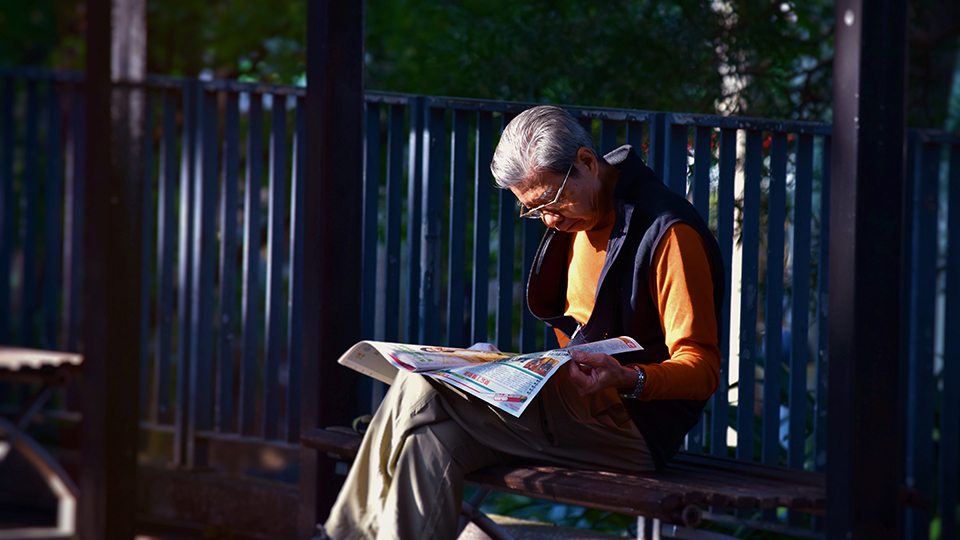Together, but still apart
Published: 26 Aug 2021

Social disconnection is a lack of social, emotional and physical engagement with other people. This results in isolation and loneliness. Risk factors such as the shrinking of family sizes, lack of family support and declining health have made it hard for older adults to keep up with social and economic activities and maintain social connections, which ultimately results in social disconnection and isolation. The social distancing measures brought about by the ongoing COVID-19 pandemic have exacerbated social isolation, especially among the elderly.
In the Singapore Chinese Health Study done by a team led by Professor Koh Woon Puay, from the Healthy Longevity Translational Research Programme at the NUS Yong Loo Lin School of Medicine and Associate Professor Feng Qiushi of the Faculty of Arts and Social Sciences showed that from 16,943 community-dwelling seniors, 78.8% of socially disconnected older adults are living with family, compared to 14.4% of socially disconnected adults who are living alone. Hence, although older adults living alone are more likely to be socially disconnected, in Singapore, the majority of socially isolated older adults still stay with their families. Among those living alone, men were twice as likely to experience social disconnection, compared to the women. This study was published in Gerontology on 16 June 2021.
In this cohort, the team also studied the factors associated with social isolation in this cohort, to see if they had similar effects among those living alone and those living with their families. The salient findings were:
- Regardless of the living arrangements, factors such as low education level, cognitive impairment, fair or poor self-rated health, depression, and limitations with daily living activities were independently associated with social disconnection.
- Among those living alone, men were twice as likely to experience social disconnection compared to women.
From these findings, Prof Koh recommends targeting community interventions to elderly men living alone, and extending its scope to older adults in poor health who live with their families. The Singapore Government has made much effort in the area of eldercare which has helped most older people to stay socially connected. Despite this, social alienation is increasingly present due to the demographic trends of population ageing and solo-living and extra effort is needed to help vulnerable individuals, especially older men. Interventions that encourage individual and personal productivity, such as paid work, volunteerism and learning new skills should be promoted among older adults to create opportunities for social interaction and maintenance of cognitive functions, Prof Koh adds.
In addition to social isolation, older adults are also at increased risk of chronic age-related diseases, as well as gradual loss of bodily functions and independence in activities of daily living. Prof Koh and Associate Professor Feng have collaborated with other scientists within NUS and other research institutions to establish the SG70 Towards Healthy Longevity cohort study, as the next study to examine the effects of biological, lifestyle and socioeconomic factors that prevent people from ageing healthily and productively. This cohort will recruit 3,000 participants, from the ages of 65 to 75 years old comprising of the three major ethnic groups in Singapore. This age group has been identified as the vulnerable period where the average Singaporean may transit from good health to poor health, and the research team will study this ageing process in the SG70 participants for the next 10 to 15 years.
The eventual aim of this SG70 cohort study is to gather scientific evidence that will form the basis for intervention studies in the near future that may slow, halt or reverse the ageing process, in order to help people age more healthily, avoid age-related diseases and maintain a good quality of life in their twilight years.
News Coverage
- “Elderly may feel isolated even while living with kin”, The Straits Times, 27 August 2021
- “Elderly people may feel lonely, isolated even while living with family: Study”, The Straits Times, 27 August 2021
- “国大研究发现: 有孤独感年长者 近八成与家人同住”, Lianhe Zaobao, 27 August 2021
- “Warga emas mungkin tetap rasa sunyi dan terasing walau tinggal bersama keluarga: Kajian”, Berita Harian, 27 August 2021
- “Studying living arrangements of socially disconnected seniors in Singapore”, California News Times, 27 August 2021
- “Studying living arrangements of socially disconnected seniors in Singapore”, Today UK News, 27 August 2021
- “NUS Study on Social Isolation among Elderly”, CNA938 Health Matters, 14 September 2021

